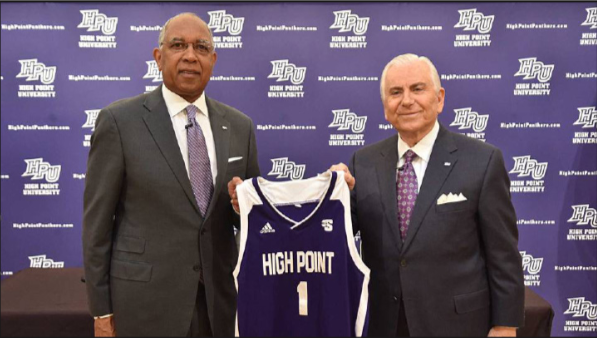HPU hires alumnus Tubby Smith as new men’s basketball coach

By Collin Giuliani // Sports Editor
On March 27, HPU President Nido Qubein announced that Tubby Smith would become the new head coach of the men’s basketball team. Smith will become the 12th coach in the history of the program, and the fourth coach since HPU made the jump to Division I in 1999.
“Tubby Smith is a nationally admired, transformational coach whose career brings honor to his alma mater as a distinguished alumnus,” said Qubein. “We are excited to welcome both Tubby and Donna [Smith’s wife] back home to HPU.”
Smith played for then High Point College from 1969-73. He finished his playing career with 1,589 points in four seasons, which was the fourth most in program history at the time (ninth most all-time today). While at High Point College, he met his wife, Donna, who was a homecoming queen. His final season (1972/73) was the first season for head coach Jerry Steele, who finished his coaching career with the most wins in program history (457 wins), and was in attendance during the announcement.
After his playing career, Smith became a coach, serving as the high school coach for Great Mills High School from 1973-77 and Hoke Coutny High School from 1977-79. Following assistant coaching jobs at Virginia Commonwealth, South Carolina and Kentucky, Smith received his first NCAA head coaching job at Tulsa in 1991. There, he coached the Golden Hurricane for four seasons, leading Tulsa to the Sweet 16 in his final two seasons. Prior to Smith’s arrival, Tulsa had not won a game in the NCAA Tournament since 1955.
Smith then took the head coaching job at Georgia for two seasons before becoming the head coach at Kentucky in 1997. In his first season with the Wildcats, he won the national championship, leading Kentucky to its seventh NCAA Tournament victory in school history. In 10 seasons with Kentucky, Smith led the Wildcats to the NCAA Tournament all 10 times, won a tournament game in all 10 seasons, and made it to the Elite Eight four times.
Following his 10-year stint at Kentucky, Smith coached at Minnesota for six seasons, leading the Golden Gophers to the NCAA Tournament three times. In his final season with Minnesota (2012-13), he led Minnesota to its first NCAA Tournament win since 1997. Smith became the head coach at Texas Tech in 2013, and led the Red Raiders to the NCAA Tournament in the 2015-16 season, which was the first tournament appearance for Texas Tech since 2007. Most recently, Smith was the head coach at Memphis, where despite a 21-13 record this past season and a 40-26 record over the past two seasons, he was fired after failing to make the NCAA Tournament.
Smith has been honored by HPU for his accomplishments before. A picture of him winning the 1998 NCAA Tournament with Kentucky hangs in the halls of the Millis Center. On Dec. 7, 2011, during a game between HPU and Wake Forest, HPU honored Smith by hanging a banner on the back wall of the Millis Center; Smith is one of only five Panthers to have a banner. And, on Feb. 6, 2017, it was announced that the court at the new Nido and Mariana Qubein Arena would be named after Smith following his one million dollar donation to the school.
Smith will replace Scott Cherry in this position. Cherry, who had been the head coach at HPU since the 2009-10 season, finishes his career with a 146-134 overall record, and a 91-65 record in Big South play. His 146 overall wins is the seventh most in Big South history, and his 91 conference wins is the sixth most in conference history. However, Cherry won just one Big South Tournament game in his final six seasons, which is tied with Presbyterian College for the fewest conference tournament wins in the past six seasons. This statistic includes Virginia Military Institute, which left the Big South at the end of the 2013-14 season, and Coastal Carolina, which left the Big South at the end of the 2015-16 season. Additionally, in nine seasons, Cherry never made it to the Big South Championship or the NCAA Tournament. HPU has not made it to the Big South Championship since the 2003-04 season, which is the longest active drought in the conference.